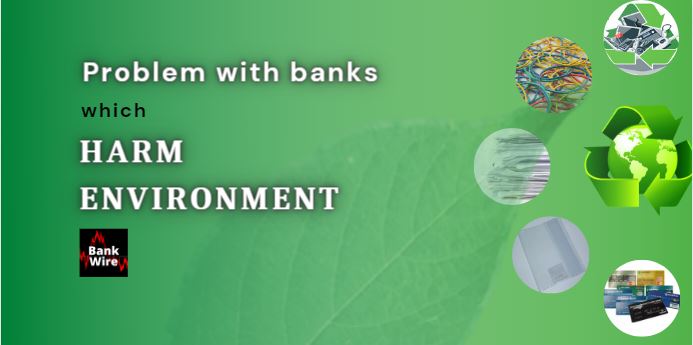
Problem with banks which harm environment
Common things used in Banks which are harming environment, Alternatives which can be adopted by banks
Problem with banks: You have hardly heard of steps taken to make the banking sector environment friendly or eco-friendly. We do not consider the banking sector as a contributor to plastic wastage. However, it is a bitter truth that banks are increasing plastic waste, usage of paper and mounting e waste which is not appropriately disposed of. In this article we will see some problems with banks which show how banks are contributing to increasing plastic waste and cutting of trees by using high volumes of papers. Also, we will see solutions or alternatives to these problems.
Problem with banks: Plastic Cards
Use of plastic starts from the welcome kit of banks. When we open our account, banks hand over us a welcome kit (especially private sector banks) in which contains a plastic card. To elaborate it more precisely, the plastic credit cards and debit cards are composed of polyvinyl chloride acetate most commonly popular as PVCA or PVC. Now I will have a question about how it is increasing plastic waste. Almost 85% of Indians have their bank account, out of which many people have 2 or more bank accounts. If we calculate the number of accounts, approximately there are more than 100 Cr bank accounts in India if we assume that one person has one account. Most of the people having bank accounts also have at least one debit and one credit card. Now you can assume the number of plastics circulating in the country.
Not only this, but the undelivered cards also have expiry date which is 3 months from the allotment of cards for a specific scheme such as Jan Dhan Yojana, Rupay Card launch etc. If we talk about public sector banks, many people requesting for debit cards do not collect their card or card is not delivered to them for some or the other reason. This has mounted plastic cards in branches of banks. Since there is lack of awareness and unavailability standard procedure to dispose of utilized or invalid cards, employees throw these cards either in bins or burn the spare cards.
Solution:
Use of technology to transact online. Banks can allot a unique number to every customer which they can use this while shopping or withdrawing money from machines instead of issuing cards. UPI or Aadhar based withdrawals are examples of such transactions where a customer can withdraw money by placing biometric figure prints. Also, mobile applications like PhonePe and PayTM use UPI to complete a transaction while shopping. This may reduce or replace plastic cards.
Problem with banks: Use of plastic folders
Use of plastic folders to keep documents. Most banks use plastic folders or files to keep important documents. A single branch of a bank opens 10-15 savings accounts and loan accounts and closes 4-5 loan or other accounts per day. In India, public sector banks have more than 88000 branches across the country. If we calculate the figure roughly, only public sector banks in India use more than 10 Lakhs plastic folders. This figure does not include private sector banks and banks other than PSU. The used folders are also shown the way to dustbins.
Solution: In place of plastic folders, banks can use folders made of cardboard or cloths which can be reused for putting a new set of documents. Long back, banks were using cloth-based folders which are now replaced by plastic folders. Folders made of cloth can be easily disposed of.
Problem with banks: use of Rubber Bands
Banks use rubber bands on bank note packets and bundles. The usage of rubber bands is so high that single branches use 1 packet of rubber band in 2-3 days. A packet of rubber band has 200-250 pieces. Almost the same number of used rubber bands a single branch of a bank throws on a daily basis. We assume the numbers. Sometimes old rubber bands get permanently stuck to the bank notes and removing the rubber band damages the bank note.
Solution: RBI and government of India is focusing on this issue. Banks may use paper seals or cotton thread to tie bank notes. This can reduce or stop usage of rubber bands.
Problem: Plastic cover
To carry cheque books or deposit receipts. Banks offer their customers plastic covers to keep deposit receipts or cheque books safely. Banks use these covers in large numbers.
Solution: Banks may stop issuing paper-based deposit receipts to their customers. Instead of this bank should issue e receipts which is easier to maintain and also increase availability of receipts. This way banks may reduce usage of plastic covers.
Problem with banks: Plastic banners
Very occasionally banks organize events such as loan distribution, new scheme intimations, to showcase achievements, to advertise, to welcome guests (Senior executives) etc. The banners are hardly reused by a branch and thrown just like that in waste. Banks waste a huge number of banners.
Solutions: Banks may install LED bases display or paper-based banners for this purpose.
Problem with banks: High usage of paper
Almost every single modification, signing agreements, withdrawals by customers visiting branches, deposits and every other thing is not completed without using a paper. The reports submitted by branches to higher level officers, meetings, and proposals consume a very huge number of A4 sheets. Which after some time are of no use and wasted in bins.
Solution: Banks may use electronic mode to sign agreements, publishing reports, and transactions done by visiting customers. Banks may introduce app-based facilities to update details.
Problem: E waste
This is a harsh reality that banks are using a technology which is way behind the present requirement. The machinery does not work very often. Old machinery must be replaced by a new one. The replacement of old machinery is increasing e waste in banks. The e waste in banks is at a very large scale. Banks do not assign vendors to collect the e waste and dispose of it properly.
Solution: Banks may hire staff for e waste management rather than relying on third party vendors. The staff can more efficiently solve the issue of e waste and old machinery.
However, To make the banking environment friendly, not only banks but also customers need to take initiatives. Almost all the banks in India have launched their mobile application to transfer funds, updating details, opening of accounts and much more. But there is a lack of awareness among people. Also some customers are reluctant to use technology while banking. However, the government of India and Reserve bank of India, have taken it seriously and issued guidelines to manage e waste.
Other articles:
- RBI card tokenization to secure digital payment
- How to complaint against Bank with Bank Ombudsman
- Banking Term and technical words you must know
- Banks in India: Government Banks | Private Banks | Digital Banks | Foreign Banks| List of all banks
- Tricks to save Tax, 15 Tricks
Read Category-wise posts
Banking | Bank Account | Bank Deposit Schemes | Loans | Bank Cards | Credit Cards | Debit Cards | Search IFSC & MCLR Code | Insurance | Bank Jobs and Exams | Stock Market | GST | EMI Calculator




